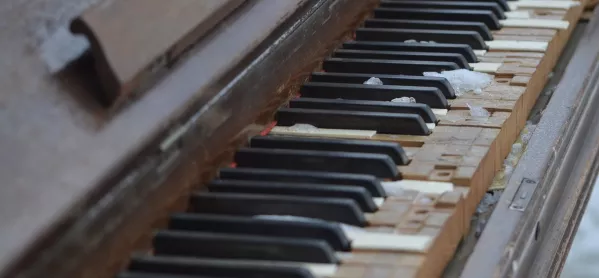Less time is being spent teaching music, art and drama in secondary schools than in 2011, while an increasing number of hours are being devoted to core subjects, research shows.
A new analysis by Tes of Department for Education data shows that English, maths and science alone now take up more than half (51 per cent) of key stage 4 teaching time in secondaries, up from 44.5 per cent in 2011.
Meanwhile, less time is being spent on the arts – music, art and drama – and subjects linked with wellbeing, such as PE and PSHE.
Last week, Tes revealed how exam preparation was beginning to swallow up the whole of secondary school, with exam boards marketing GCSE-style tests for Year 7 pupils.
Meanwhile, exam entry figures renewed fears about the decline of subjects like music.
The new analysis reveals significant changes to the balance of the hours spent teaching different subjects in secondary schools in the past eight years.
The latest figures, for 2017, show that:
- At key stage 3, less time is being spent teaching music (down by 11 per cent), art (down by 9 per cent) and drama (down by 7 per cent), compared with 2011. While at key stage 4, music is down 12 per cent, art is down 20 per cent and drama is down 26 per cent;
- Languages, despite being in the English Baccalaureate, remain in trouble. There has been a rise in Spanish, with 32 per cent more time at key stage 4. But French is down 11 per cent and German down 22 per cent;
- Design and technology has fallen precipitously, with 19 per cent fewer hours devoted in KS3 and 40 per cent fewer in KS4;
- ICT has fallen by 51 per cent in KS3. While computer science teaching has now taken up some of that, ICT used to account for 4.2 per cent of KS3 curriculum time in 2011 – now ICT and computing together take up 3 per cent of KS3 curriculum time.
“We believe schools should be making their own curriculum decisions that are in the best interests of the young people in their school,” Malcolm Trobe, deputy general secretary of the Association of School and College Leaders, said. “However, the reality is that performance measures are what schools are judged on, so this puts an undue amount of pressure on leaders, governors and trusts.”
'Impact of the EBacc'
The performance measures for secondary schools are based on GCSE grades, and this summer saw the first results for the bulk of the new “tougher” GCSEs.
NASUWT national official for education Darren Northcott said: “I don’t think it is a coincidence that this significant decline [in some subjects] has happened since the EBacc was introduced.
“The statistics emphasise that very strongly in terms of the distribution of curriculum time. We are seeing a greater proportion of time given to EBacc subjects and the marginalisation of non-EBacc subjects.”
Ofsted chief inspector Amanda Spielman has already spoken of her concern that “testing has come inadvertently to mean the curriculum in its entirety”, and has previously raised fears about an increasingly restrictive curriculum in KS3, particularly for low-attaining pupils.
Poorer pupils 'missing out'
Sam Cairns, co-director of the Cultural Learning Alliance, which represents 10,000 arts organisations campaigning for children to have access to culture and the arts, said: “It is a social justice issue. The middle classes continue to provide their children with access to arts, if they are no longer provided in school. So they continue to enjoy the benefits while the kids whose parents can’t pay don’t get the same boost.”
The Department for Education points out that music is compulsory in maintained schools from age 5-14, and drama must be studied as part of English. It says that the number of pupils taking an arts GCSE is largely stable.
A DfE spokesperson said: “We are investing nearly £500 million in music and arts education programmes between 2016 and 2020. This includes £300 million for a network of music education hubs to ensure every child aged between 5-18 has the opportunity to learn to play a musical instrument, and £96 million to help talented pupils from all backgrounds attend prestigious arts institutions, such as the Royal Ballet School in London and Chetham’s School of Music in Manchester.”
This is an edited article from the 31 August edition of Tes. Subscribers can read the full article here. To subscribe, click here. This week's Tes magazine is available in all good newsagents. To download the digital edition, Android users can click here and iOS users can click here





